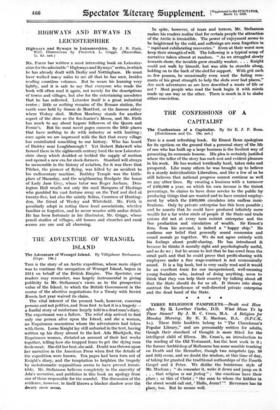THE ADVENTURE OF WRANGEL ISLAND
The Adventure of Wrangel Island. By Vilhjalmur Stefansson. (Cape. 18s.) The Adventure of Wrangel Island. By Vilhjalmur Stefansson. (Cape. 18s.) THIS is the story of an Arctic expedition, whose main object was to continue the occupation of Wrangel Island, begun in 1914 on behalf of the British Empire. The Spectator, our readers may remember, was largely instrumental in giving publicity to Mr. Stefansson's views as to the prospective value of the Island, to which the British Government in the course of the abortive negotiations for a Treaty with Soviet Russia last year waived its claim.
The vital interest of the present book, however, concerns persons and not polities, and from first to last it is a tragedy— a fearful story of misfortune largely told in a dead man's diary. The experiment was a failure. The relief ship arrived to find Only one person alive upon the Island, and she a woman, an Esquimaux seamstress whom the adventurers had taken with them. Lorne Knight lay still unburied in the tent, having written up his diary ahnost to the last. Ada Blackjack, the Esquimaux woman, dictated an account of their last weeks together, telling how she trapped foxes to get the dying man fresh meat. She did her best, she said. Doubt was thrown upon her narrative in the American Press when first the details of the expedition were known. Ten pages had been torn out of Knight's diary, and the temptation to heighten the tragedy by melodramatic suppositions seems to have proved irresis- tible. Mr. Stefansson believes completely in the sincerity of Ada's narrative, and publishes in this book an apology from one of those responsible for the scandal. The discussion of the evidence, however, in itself throws a blacker shadow over the dreary snow scene. In spite, however, of tears and terrors, Mr. Stefansson makes his readers realize that for certain people the attraction of the Arctic is irresistible. The power of enjoyment seems to be heightened by the cold, and sufferings are soon forgotten in " rapid and exhilarating recoveries." Even at their worst men keep their strength of will. The following is a typical scrap of narrative taken almost at random. " As we struggled slowly towards shore, the invalids grew steadily weaker. . . . Knight could not walk by himself, but was able to stumble along, holding on to the back of the sled for support. With grit such as few possess, he occasionally even used the failing rem- nants of his great strength to help the sleds over bad places." Are such adventures as are here described a waste of life or not ? Most people who read the book begin it with minds made up one way or the other. There is much in it to shake either conviction.






























































 Previous page
Previous page